February 2023 College & Young Adult Conference
.

Alternating Sundays:
9 AM Orthros Prayer Service &
10 AM Divine Liturgy Communion Service
—
10 AM Typica Service
—
The 10 AM Sunday services are followed by Coffee Hour and Fellowship.
GENERAL ASSEMBLY OF THE PARISH ON 1/29/2023
Immediately following Divine Liturgy, during Coffee Hour, we will have General Assembly of the Parish. Everyone, please, make sure to attend.
~
HOUSE BLESSINGS / HOLY CONFESSION
Please contact Fr. Nektarios at ericmorrow@outlook.com or by phone at 325-642-1340 to schedule house blessings and Holy Confession for the weekend of January 28-29.
~
FAREWELL MESSAGE FROM FR. MARK GIVEN AT THE SERVICE ON JANUARY 15:
"Today is my last Sunday as the priest of the parish. I'm very grateful to have served you for the past 6 years. I hope the parish will flourish and grow in the future.
"You are very blessed to have a priest of the caliber of Fr. Nektarios to take over your care. I will continue to pray for you all and hope you will pray for me and my family. God bless! Father Mark."
Fr. Mark has been our presiding priest since 2017. He will now serve as an adjunct priest at Holy Trinity in Dallas, while attending medical school in Fort Worth.
~
UPCOMING SERVICES
~
ONLINE CATECHISM CLASS
There will be no catechism class this week.
Previous classes are archived on YouTube at https://www.youtube.com/channel/UC7ronGHeNPzEgi9mDcF0Y2A/streams
Questions? Email Fr. Nektarios
~
Orthodox Homeschool Mom's Luncheon
Saturday, January 28, 2023 11:00 am - 2:00 pm
Registration:
Location:
St. John the Baptist Greek Orthodox Church
(held in the Parish Center/Church Hall)
303 Cullum Drive
Euless, TX 76040
Ticket Cost:
More Information: https://onrealm.org/stjohndfw/PublicRegistrations/Event?linkString=NjI1YWQ0MjktZTIzYi00ZTkxLTg1OTEtYWY1YjAxMjE2YmIx
~
FASTING
Question: Why do we fast?
Answer: Because Christ did. He also said that we need to fast to increase our spiritual strength. “This kind can come out by nothing but prayer and fasting.” (Mark 9:29)
Answer: Because Christ was betrayed on a Wednesday, and crucified on a Friday.
~
CARING MEALS MINISTRY
If you know someone who needs meals due to illness, birth, etc., please see Kathy Baughman or Noelle Bartl. Thank you to everyone who volunteers for this ministry. You are being the hands of Christ!
~
BAKE SALE FUNDRAISER FOR CHURCH
We are still accepting orders for Greek Pastries. All proceeds go to supprt the operating costs of our parish. Please contact Wilma Dunias, a member of our parish, at baklavabywilma@live.com or 720-989-7928.
~
HELP FOR THE GARCIA FAMILY
~
PARISH COUNCIL
The next meeting will be in January, during Coffee Hour.
~
COFFEE HOUR
We have open slots on the sign up sheet for Coffee Hour, which can be found on the refrigerator in the church kitchen. Can you help host? It's okay to bring something simple, or even just one dish. Encourage others to sign up with you as co-hosts. "Many hands make the burden light." Thank you for your help!
~
Check out the rest of the bulletin online! See below for news from the world of Orthodoxy, online concerts and lecture series, and more.
~
SPECIAL OCCASIONS FOR JANUARY
Birthdays: Joanna Garcia, Marika Harris, Amy McDaniel
Anniversaries: Fr. Mark Lichtenstein, Ordination to the Diaconate on St. Anthony’s Day
Namedays:
1/1 Tim Beys (St. Telemachos the Martyr)
1/2 Dustin Clopton (St. Seraphim of Sarov)
1/7 John Choate, Joanna Garcia, Joanna Kalaitzes, John Pete Kouvelis, John Lichtenstein, Heidi Papachristos, Joanna Weir, John Wimberley (all named after St. John the Baptist)
1/13 Hilary Choate (St. Hilary of Poitiers)
1/17 Anthony Bartl (St. Anthony)
Memorials: none
~
AFTER CHURCH
Please join us for refreshments in the Social Hall.
** As always, see the parish website for any changes and updates. **
JOYFUL FASTING
When you hear that Lent is coming, do you close your eyes and groan? What if I said there is a secret to not starving when you fast — would that help you fast more cheerfully?
Well, there is. Fasting is about more than just food, of course, but let's face it: It's hard to do those other things when we are low on energy due to not getting good nutrition.
So here it is: The secret to fasting without starving is eating complementary protiens, such as beans + rice.
Proteins are made of amino acids. Meats, seafood, and dairy have all the amino acids our bodies need, so they are called "complete proteins."
Most fasting foods, however, rely on "partial proteins." In a beans-and-rice dish, for example, beans have some of the amino acids our bodies need daily...and rice has the others. They are complementary to each other, meaning that they complete each other by being together.
When we pair partial proteins together, we can create a "complete protein." Instead of feeling like we are starving during Lent, we can feel light and satisfied. We just need to know there are two categories of partial proteins, and we need one from each category to create a complete, satisfying protein.
Category 1: Beans*, seeds, peas, nuts**
Category 2: Rice, potatoes, corn, grains, bread, pasta, tortillas
*See below for tips on how to avoid gassiness from beans.
**It is not recommended to bring nut dishes to public events.
Did you know that fasting foods are supposed to be simple to prepare? This is so we can have more time to spend on praying, reading our Bibles, going to weekday services, studying about saints and Church history, giving alms, and doing good deeds for others, as caring Christ-followers should.
These physical actions of devotion, alms-giving, and doing good deeds are part of fasting. Why? Because we are fasting from some of our worldly activities (such as more-elaborate meal preparation) and devoting our time and attention to Christ.
It's not that elaborate meal preparation is unholy — not at all! Fancier cooking is simply an activity we give up on Wednesdays and Fridays, and all during Lent, so we can devote more of our time and energy to Christ.
Even so, fasting food can be tasty! Here are two examples:
Tips:
Worried about gas from beans? Watch this video about proper preparation of beans to make them more digestible.
If you prefer canned beans, we recommend using Eden Organic canned beans. They are prepared with overnight soaking to avoid gassiness.
Actually, soaking is good to do for more than just beans: Soaking any partial protien before cooking improves its digestibility. In other words, soaking before cooking makes it easier for your body to break down the food, and lets you absorb more nutrients from it. For more on this, see the article, "Living with Phytic Acid."
~
COOKBOOK RECOMMENDATION
Looking for a fasting cookbook that deals with modern diets like paleo, gluten-free, and nut-free? That isn't ethnic?
Article on "Joyful Fasting" © 2022 Presvytera Suzanne Thorpe Lichtenstein, used by permission
.
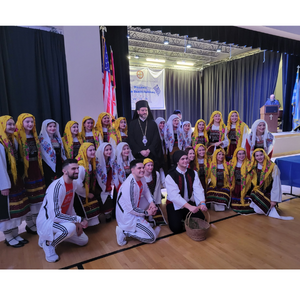 For the first time since before the COVID-19 Pandemic, the Greek Orthodox Metropolis of New Jersey, with the blessings of His Eminence Archbishop Elpidophoros of America, held its annual Hellenic Folk Dance Festival (FDF) on January 14 – 15, 2023, which took place at SS. Constantine and Helen Greek Orthodox Church in Annapolis, Maryland, and was co-chaired by the Vicar General of the Metropolis, the Rev. Protopresbyter Kosmas Karavellas and Mrs. Felicia Nolan.
For the first time since before the COVID-19 Pandemic, the Greek Orthodox Metropolis of New Jersey, with the blessings of His Eminence Archbishop Elpidophoros of America, held its annual Hellenic Folk Dance Festival (FDF) on January 14 – 15, 2023, which took place at SS. Constantine and Helen Greek Orthodox Church in Annapolis, Maryland, and was co-chaired by the Vicar General of the Metropolis, the Rev. Protopresbyter Kosmas Karavellas and Mrs. Felicia Nolan.
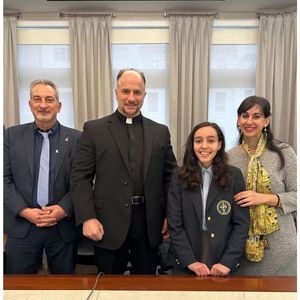 The Archdiocesan Spelling Bee Finals for the students of the District’s Greek-American Day Schools were held on Thursday, January 19th, at the Headquarters of the Greek Orthodox Archdiocese.
On behalf of His Eminence Archbishop Elpidophoros of America, Rev. Protopresbyter of the Ecumenical Throne Elias Villis, Chancellor of the Archdiocesan District, welcomed and gave a prayer to the students.
The Archdiocesan Spelling Bee Finals for the students of the District’s Greek-American Day Schools were held on Thursday, January 19th, at the Headquarters of the Greek Orthodox Archdiocese.
On behalf of His Eminence Archbishop Elpidophoros of America, Rev. Protopresbyter of the Ecumenical Throne Elias Villis, Chancellor of the Archdiocesan District, welcomed and gave a prayer to the students.
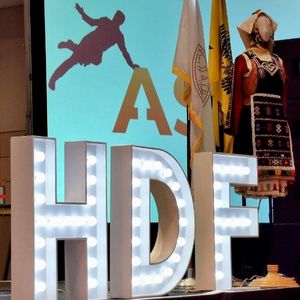 A record 3,000 participants gathered Jan. 13-16 at the Marriott Marquis in Downtown Atlanta to attend the 22nd annual Hellenic Dance Festival (HDF).
A record 3,000 participants gathered Jan. 13-16 at the Marriott Marquis in Downtown Atlanta to attend the 22nd annual Hellenic Dance Festival (HDF).
 Registration for all programs of Ionian Village 2023 opens this Saturday, January 21st at 12pm EST on ionianvillage.org!!!
Registration for all programs of Ionian Village 2023 opens this Saturday, January 21st at 12pm EST on ionianvillage.org!!!
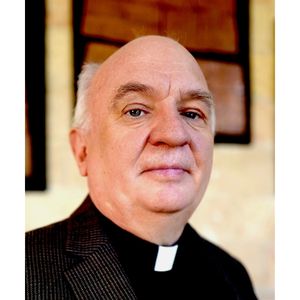 Trinitas television, the only television station broadcasting 24/7 within the Orthodox world, and established under the initiative of Patriarch Daniel of the Romanian Orthodox Church, interviewed Rev. Dr. Eugen J. Pentiuc about Scripture in Orthodoxy.
Trinitas television, the only television station broadcasting 24/7 within the Orthodox world, and established under the initiative of Patriarch Daniel of the Romanian Orthodox Church, interviewed Rev. Dr. Eugen J. Pentiuc about Scripture in Orthodoxy.
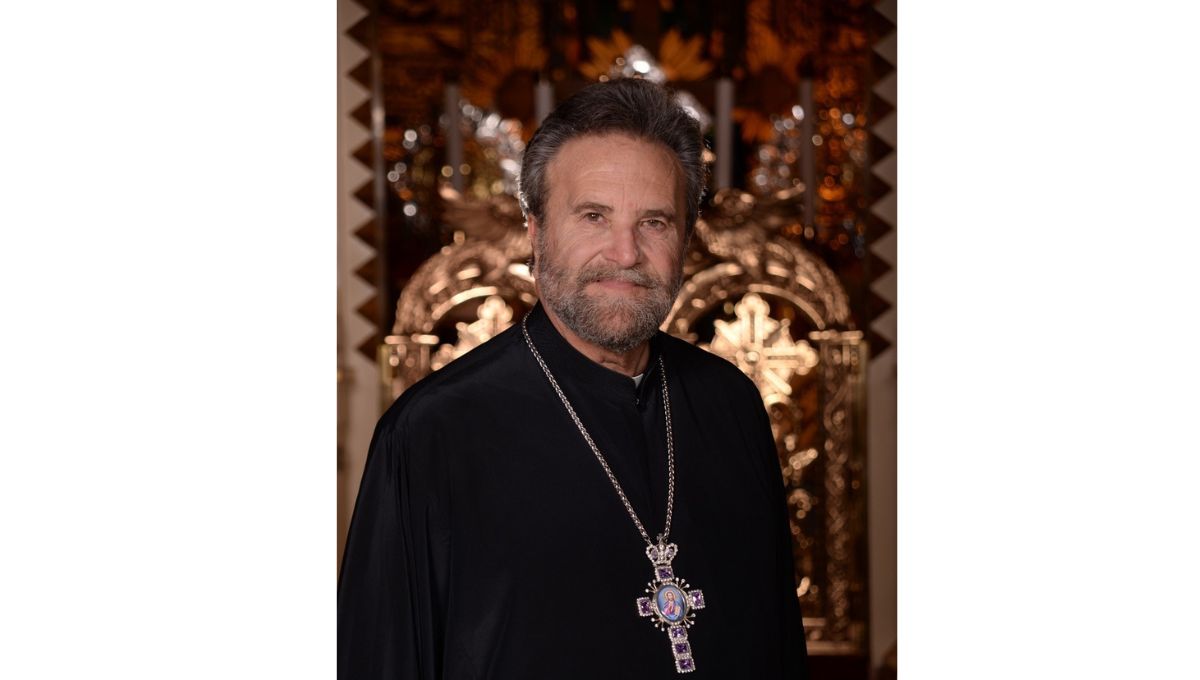 It is with great respect and affection that we announce the retirement of Very Rev. Fr. John Bakas from the historic St. Sophia Cathedral.
It is with great respect and affection that we announce the retirement of Very Rev. Fr. John Bakas from the historic St. Sophia Cathedral.
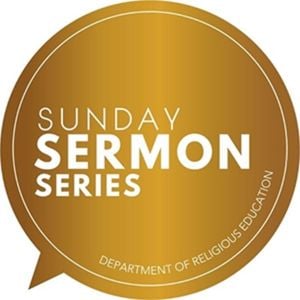 Luke 19:1-10
This week, find insights about the upcoming Gospel reading, where we learn about a short man named Zacchaeus who had to climb a tall tree to see Jesus. What does his height have to do with his spiritual life? And how is this tree connected to the cross? Also, why did the Lord tell Zacchaeus that He must stay at his house?
Luke 19:1-10
This week, find insights about the upcoming Gospel reading, where we learn about a short man named Zacchaeus who had to climb a tall tree to see Jesus. What does his height have to do with his spiritual life? And how is this tree connected to the cross? Also, why did the Lord tell Zacchaeus that He must stay at his house?
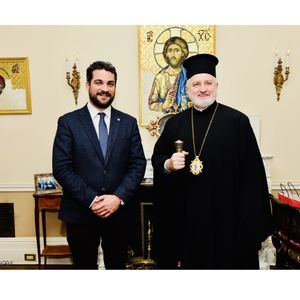 Archbishop Elpidophoros Welcomes Mayor of Chania
Archbishop Elpidophoros Welcomes Mayor of Chania
 The Liturgical Guidebook published by the National Forum of Greek Orthodox Church Musicians identifies the hymns sung, noting changes, in the Divine Liturgy on Sunday and other feasts for the ecclesiastical year.
The Liturgical Guidebook published by the National Forum of Greek Orthodox Church Musicians identifies the hymns sung, noting changes, in the Divine Liturgy on Sunday and other feasts for the ecclesiastical year.
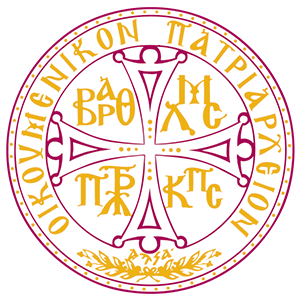 The 11th Academic Consultation between Judaism and Orthodox Christianity took place December 4-6, 2022, in Vienna, Austria. The theme was “Jewish-Orthodox Christian Dialogue: Navigating Our Relations to the World and to Each Other.” The Consultation was co-sponsored by the Ecumenical Patriarchate and the International Jewish Committee for Interreligious Consultations (IJCIC).
The 11th Academic Consultation between Judaism and Orthodox Christianity took place December 4-6, 2022, in Vienna, Austria. The theme was “Jewish-Orthodox Christian Dialogue: Navigating Our Relations to the World and to Each Other.” The Consultation was co-sponsored by the Ecumenical Patriarchate and the International Jewish Committee for Interreligious Consultations (IJCIC).
 Most honorable brother hierarchs,
Beloved children in the Lord,
Today our Holy Church celebrates the Nativity in the flesh of the pre-eternal Son and Word of God, this “foreign and strange mystery” that “was concealed from ages and from generations” (Col. 1:26).
Most honorable brother hierarchs,
Beloved children in the Lord,
Today our Holy Church celebrates the Nativity in the flesh of the pre-eternal Son and Word of God, this “foreign and strange mystery” that “was concealed from ages and from generations” (Col. 1:26).
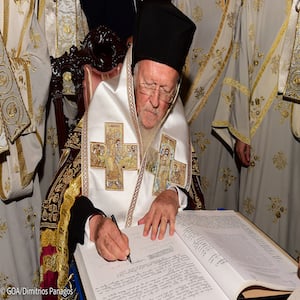 A new saint has been recognized by the Orthodox Church. In a Wednesday August 31, 2022 ceremony at the Patriarchal Church of St. George
A new saint has been recognized by the Orthodox Church. In a Wednesday August 31, 2022 ceremony at the Patriarchal Church of St. George
Tenth Orthros Gospel
The Reading is from John 21:1-14
At that time, Jesus revealed Himself again to the disciples by the Sea of Tiberias; and He revealed Himself in this way. Simon Peter, Thomas, called the Twin, Nathanael of Cana in Galilee, the sons of Zebedee, and two others of His disciples were together. Simon Peter said to them, "I am going fishing." They said to him, "We will go with you." They went out and got into the boat, but that night they caught nothing. Just as day was breaking, Jesus stood on the beach, yet the disciples did not know that it was Jesus. Jesus said to them, "Children, have you any fish?" They answered him, "No." He said to them, "Cast the net on the right side of the boat, and you will find some." So they cast it, and now they were not able to haul it in, for the quantity of fish. That disciple whom Jesus loved said to Peter, "It is the Lord!" When Simon Peter heard that it was the Lord, he put on his clothes, for he was stripped for work, and sprang into the sea. But the other disciples came in the boat, dragging the net full of fish, for they were not far from the land, but about a hundred yards off. When they got out on land, they saw a charcoal fire there with fish lying on it, and bread. Jesus said to them, "Bring some of the fish that you have just caught." So Simon Peter went aboard and hauled the net ashore, full of large fish, a hundred and fifty-three of them; and although there were so many, the net was not torn. Jesus said to them, "Come and have breakfast." Now none of the disciples dared ask Him, "Who are you?" They knew it was the Lord. Jesus came and took the bread and gave it to them, and so with the fish. This was now the third time that Jesus was revealed to the disciples after He was raised from the dead. .
Prokeimenon. 7th Tone. Psalm 28.11,1.
The Lord will give strength to his people.
Verse: Bring to the Lord, O sons of God, bring to the Lord honor and glory.
The reading is from St. Paul's First Letter to Timothy 4:9-15.
Timothy, my son, the saying is sure and worthy of full acceptance. For to this end we toil and suffer reproach, because we have our hope set on the living God, who is the Savior of all men, especially of those who believe. Command and teach these things. Let no one despise your youth, but set the believers an example in speech and conduct, in love, in faith, in purity. Till I come, attend to the public reading of scripture, to preaching, to teaching. Do not neglect the gift you have, which was given you by prophetic utterance when the council of elders laid their hands upon you. Practice these duties, devote yourself to them, so that all may see your progress.
15th Sunday of Luke
The Reading is from Luke 19:1-10
At that time, Jesus was passing through Jericho. And there was a man named Zacchaios; he was a chief collector, and rich. And he sought to see who Jesus was, but could not, on account of the crowd, because he was small of stature. So he ran on ahead and climbed up into a sycamore tree to see him, for he was to pass that way. And when Jesus came to the place, he looked up and said to him, "Zacchaios, make haste and come down; for I must stay at your house today." So he made haste and came down, and received him joyfully. And when they saw it they all murmured, "He has gone in to be the guest of a man who is a sinner." And Zacchaios stood and said to the Lord, "Behold, Lord, the half of my goods I give to the poor; and if I have defrauded any one of anything, I restore it fourfold." And Jesus said to him, "Today salvation has come to this house, since he also is a son of Abraham. For the Son of man came to seek and to save the lost."
In giving birth you remained a virgin.
And in your dormition, you did not forsake the world, O Theotokos.
For as the Mother of Life, you have yourself passed into life.
And by your prayers, you deliver our souls from death.
The Apostle Timothy, who was from Lystra of Lycaonia, was born of a Greek (that is, pagan) father and a Jewish mother. His mother's name was Eunice, and his grandmother's name was Lois (II Tim. 1:5). He became the disciple of the Apostle Paul when the latter first preached there, and he followed St. Paul during the whole period of the Apostle's preaching. Afterwards, Timothy was consecrated by him as first Bishop of the church in Ephesus. Under the supervision of John the Evangelist, who governed all the churches in Asia, he completed his life as a martyr in the year 97. He was stoned to death by the heathens, because, as some surmise, he opposed the festival held in honor of Artemis (Diana). The Apostle Paul's First and Second Epistles to Timothy were written to him.
Saint Anastasius was a Persian by race, the son of a Magus, and a soldier in the Persian army in the days of Chosroes II, King of Persia, and Heraclius, Emperor of New Rome. The Saint's Persian name was Magundat.
When Chosroes captured Jerusalem in the year 614 and took the Precious Cross away captive, Magundat heard the report of the miracles that came to pass through the Cross of our salvation. Being of a prudent mind, perplexed that an instrument of torture should be so highly honored by the Christians, yet seized with longing to learn their Faith, he diligently sought out instruction in the whole divine dispensation of Christ: His Incarnation, Passion, and Resurrection. When he learned what he sought to know, his soul was filled with wonder and joy. Withdrawing to the Holy City, he was baptized by Saint Modestus, Patriarch of Jerusalem, and became a monk, receiving the new name of Anastasius.
As he read the lives of the Saints and the accounts of the holy Martyrs, his heart was kindled with love for them to such a degree that he prayed to be counted worthy of a martyr's end like unto theirs. Finally, unable to contain his longing, he left his monastery. Encountering certain Persian Magi at Caesarea, he rebuked them for their delusion. Since Palestine was still held in the captivity of the Persians, he was taken before the Persian ruler, questioned, beaten, and imprisoned. He was then taken with other captives to Persia, where, after many tortures, refusing to espouse again the error of his fathers, he was hanged up by one hand, strangled with a noose, and beheaded. The translation of his holy relics is celebrated on the 24th of this month.
Saint Clement, who was from Ancyra in Galatia, was the son of an unbelieving father, but a believing mother whose name was Sophia. At first he lived as a monk, later he became the bishop of his city. He suffered so many things in confession of the Faith in Christ, that the time of his sufferings and struggles stretched out over a period of twenty-eight years. Finally he and Saint Agathangelus (who was from Rome) were beheaded together during the reign of Diocletian and Maximian, in the year 296.
Saint Agathangelus (who was from Rome) along with Saint Clement, Bishop of Ancyra, were beheaded together during the reign of Diocletian and Maximian, in the year 296.
Saint Clement, who was from Ancyra in Galatia, was the son of an unbelieving father, but a believing mother whose name was Sophia. At first he lived as a monk, later he became the bishop of his city. He suffered so many things in confession of the Faith in Christ, that the time of his sufferings and struggles stretched out over a period of twenty-eight years. Finally he and Saint Agathangelus (who was from Rome) were beheaded together during the reign of Diocletian and Maximian, in the year 296.
Our righteous Mother Xenia of Rome was of a distinguished family. While her parents were preparing to wed her, she stole away secretly, taking two handmaids with her, and departed for Mylasa of Karia in Asia Minor, and there she completed her life in asceticism. She was ordained deaconess by Paul, her spiritual father, who became Bishop of Mylasa. Although she was originally named Eusebia, to conceal her identity, she took the name Xenia - which means "stranger" in Greek - because of her estrangement from her country.
Our righteous Mother Xenia of Petersburg was born about the year 1730. She was married to a Colonel named Andrew; when she was twenty-six years old, her husband died suddenly, having been drinking with his friends. Left a childless widow, Xenia gave away all that she had, and vanished from Saint Petersburg for eight years; it is believed that she spent this time in a hermitage, learning the spiritual life. When she returned to Saint Petersburg, she wore her husband's military clothing, and would answer only to the name Andrew, that is, the name of her late husband. She took up the life of a homeless wanderer, and was abused by many as insane; she bore this with great patience, crucifying the carnal mind through the mockery she endured, and praying for her husband's soul. She was given great gifts of prayer and prophecy, and often foretold things to come; in 1796 she foretold the death of Empress Catherine II. Having lived forty-five years after her husband's death, she reposed in peace at the age of seventy-one, about the year 1800. Her grave became such a source of miracles, and so many came to take soil from it as a blessing, that it was often necessary to replace the soil; when a stone slab was placed over her grave, this too disappeared over time, piece by piece. Saint Xenia is especially invoked for help in finding employment, lodging, or a spouse.
This great Father and Teacher of the Church was born in 329 in Arianzus, a village of the second district of Cappadocia, not far from Nazianzus. His father, who later became Bishop of Nazianzus, was named Gregory (commemorated Jan. 1), and his mother was named Nonna (Aug. 5); both are among the Saints, and so are his brother Caesarius (Mar. 9) and his sister Gorgona (Feb. 23). At first he studied in Caesarea of Palestine, then in Alexandria, and finally in Athens. As he was sailing from Alexandria to Athens, a violent sea storm put in peril not only his life but also his salvation, since he had not yet been baptized. With tears and fervour he besought God to spare him, vowing to dedicate his whole self to Him, and the tempest gave way to calm. At Athens Saint Gregory was later joined by Saint Basil the Great, whom he already knew; but now their acquaintanceship grew into a lifelong brotherly love. Another fellow student of theirs in Athens was the young Prince Julian, who later as Emperor was called the Apostate because he denied Christ and did all in his power to restore paganism. Even in Athens, before Julian had thrown off the mask of piety; Saint Gregory saw what an unsettled mind he had, and said, "What an evil the Roman State is nourishing" (Orat. V, 24, PG 35:693).
After their studies at Athens, Gregory became Basil's fellow ascetic, living the monastic life together with him for a time in the hermitages of Pontus. His father ordained him presbyter of the Church of Nazianzus, and Saint Basil consecrated him Bishop of Sasima (or Zansima), which was in the archdiocese of Caesarea. This consecration was a source of great sorrow to Gregory, and a cause of misunderstanding between him and Basil; but his love for Basil remained unchanged, as can be plainly seen from his Funeral Oration on Saint Basil (Orat. XLIII).
About the Year 379, Saint Gregory came to the assistance of the Church of Constantinople, which had already been troubled for forty years by the Arians; by his supremely wise words and many labours he freed it from the corruption of heresy, and was elected Archbishop of that city by the Second Ecumenical Council, which assembled there in 381, and condemned Macedonius, Archbishop of Constantinople, the enemy of the Holy Spirit. When Saint Gregory came to Constantinople, the Arians had taken all the churches and he was forced to serve in a house chapel dedicated to Saint Anastasia the Martyr. From there he began to preach his famous five sermons on the Trinity, called the Triadica. When he left Constantinople two years later, the Arians did not have one church left to them in the city. Saint Meletius of Antioch (see Feb. 12), who was presiding over the Second Ecumenical Council, died in the course of it, and Saint Gregory was chosen in his stead; there he distinguished himself in his expositions of dogmatic theology.
Having governed the Church until 382, he delivered his farewell speech - the Syntacterion, in which he demonstrated the Divinity of the Son - before 150 bishops and the Emperor Theodosius the Great; in this speech he requested, and received from all, permission to retire from the see of Constantinople. He returned to Nazianzus, where he lived to the end of his life, and reposed in the Lord in 391, having lived some sixty-two years.
His extant writings, both prose and poems in every type of metre, demonstrate his lofty eloquence and his wondrous breadth of learning. In the beauty of his writings, he is considered to have surpassed the Greek writers of antiquity, and because of his God-inspired theological thought, he received the surname "Theologian." Although he is sometimes called Gregory of Nazianzus, this title belongs properly to his father; he himself is known by the Church only as Gregory the Theologian. He is especially called "Trinitarian Theologian," since in virtually every homily he refers to the Trinity and the one essence and nature of the Godhead. Hence, Alexius Anthorus dedicated the following verses to him:
Like an unwandering star beaming with splendour,
Thou bringest us by mystic teachings, O Father,
To the Trinity's sunlike illumination,
O mouth breathing with fire, Gregory most mighty.
This Saint, a wealthy nobleman of Constantinople, was filled with piety toward God. He had two sons, Arcadius and John, whom he sent to Beirut to study law. But they were shipwrecked during their voyage; barely saved, they forsook all things and departed for Palestine. Saint Xenophon and his wife Mary, ignorant of what had happened, went in search of their sons. On finding them in Jerusalem, dressed in the habit of monks, they also took up the monastic life. And thus, having completed their lives in holiness, they departed for the Lord about the beginning of the sixth century. Saint Xenophon and his sons reposed at Saint Sabbas Monastery, and Mary at the Monastery of Saint Theodosius.
This event took place on this day in the year 438, when Saint Theodosius the Younger had been Emperor for thirty years; he was the son of Arcadius, and Eudoxia, who had exiled Saint John. The Archbishop of Constantinople at that time was Proclus, who had been the Saint's disciple (see Nov. 13 and Nov. 20).
Saint Ephraim was born in Nisibis of Mesopotamia some time about the year 306, and in his youth was the disciple of Saint James, Bishop of Nisibis, one of the 318 Fathers at the First Ecumenical Council. Ephraim lived in Nisibis, practicing a severe ascetical life and increasing in holiness, until 363, the year in which Julian the Apostate was slain in his war against the Persians, and his successor Jovian surrendered Nisibis to them. Ephraim then made his dwelling in Edessa, where he found many heresies to do battle with. He waged an especial war against Bardaisan; this gnostic had written many hymns propagating his errors, which by their sweet melodies became popular and enticed souls away from the truth. Saint Ephraim, having received from God a singular gift of eloquence, turned Bardaisan's own weapon against him, and wrote a multitude of hymns to be chanted by choirs of women, which set forth the true doctrines, refuted heretical error, and praised the contests of the Martyrs.
Of the multitude of sermons, commentaries, and hymns that Saint Ephraim wrote, many were translated into Greek in his own lifetime. Sozomen says that Ephraim "Surpassed the most approved writers of Greece," observing that the Greek writings, when translated into other tongues, lose most of their original beauty, but Ephraim's works "are no less admired when read in Greek than when read in Syriac" (Eccl. Hist., Book 111, 16). Saint Ephraim was ordained deacon, some say by Saint Basil the Great, whom Sozomen said "was a great admirer of Ephraim, and was astonished at his erudition." Saint Ephraim was the first to make the poetic expression of hymnody and song a vehicle of Orthodox theological teachings, constituting it an integral part of the Church's worship; he may rightly be called the first and greatest hymnographer of the Church, who set the pattern for these who followed him, especially Saint Romanos the Melodist. Because of this he is called the "Harp of the Holy Spirit." Jerome says that his writings were read in some churches after the reading of the Scriptures, and adds that once he read a Greek translation of one of Ephraim's works, "and recognized, even in translation, the incisive power of his lofty genius" (De vir. ill., ch. CXV).
Shortly before the end of his life, a famine broke out in Edessa, and Saint Ephraim left his cell to rebuke the rich for not sharing their goods with the poor. The rich answered that they knew no one to whom they could entrust their goods. Ephraim asked them, "What do you think of me?" When they confessed their reverence for him, he offered to distribute their alms, to which they agreed. He himself cared with his own hands for many of the sick from the famine, and so crowned his life with mercy and love for neighbor. Saint Ephraim reposed in peace, according to some in the year 373, according to others, 379.
Saint Ignatius was a disciple of Saint John the Theologian, and a successor of the Apostles, and he became the second Bishop of Antioch, after Evodus. He wrote many epistles to the faithful, strengthening them in their confession, and preserving for us the teachings of the holy Apostles. Brought to Rome under Trajan, he was surrendered to lions to be eaten, and so finished the course of martyrdom about the year 107. The remnants of his bones were carefully gathered by the faithful and brought to Antioch. He is called God-bearer, as one who bare God within himself and was aflame in heart with love for Him. Therefore, in his Epistle to the Romans (ch. 4), imploring their love not to attempt to deliver him from his longed-for martyrdom, he said, "I am the wheat of God, and am ground by the teeth of the wild beasts, that I may be found to be the pure bread of God."
Saint John Chrysostom has a homily in honour of the translation of the Saint's relics (PG 50:587).